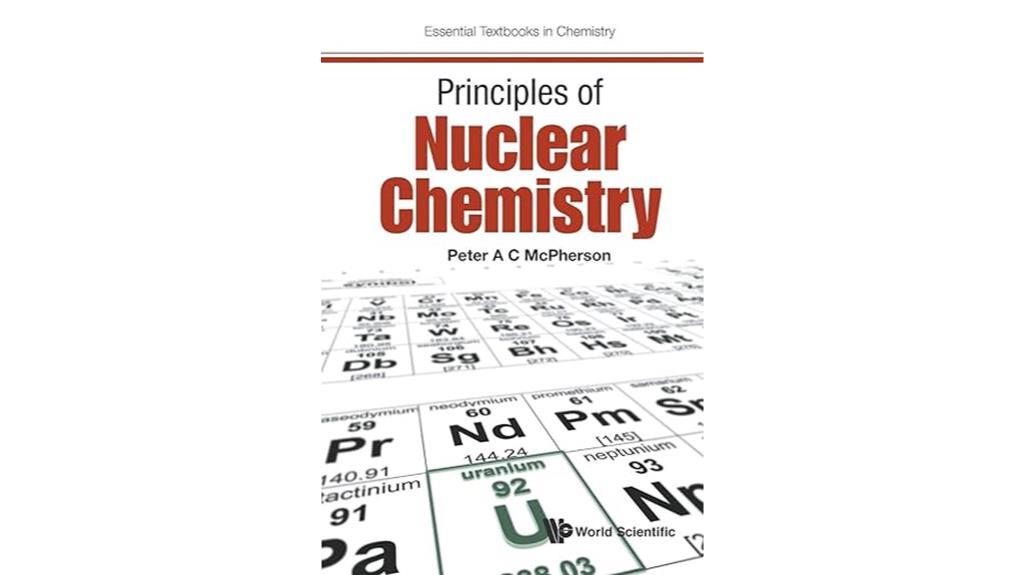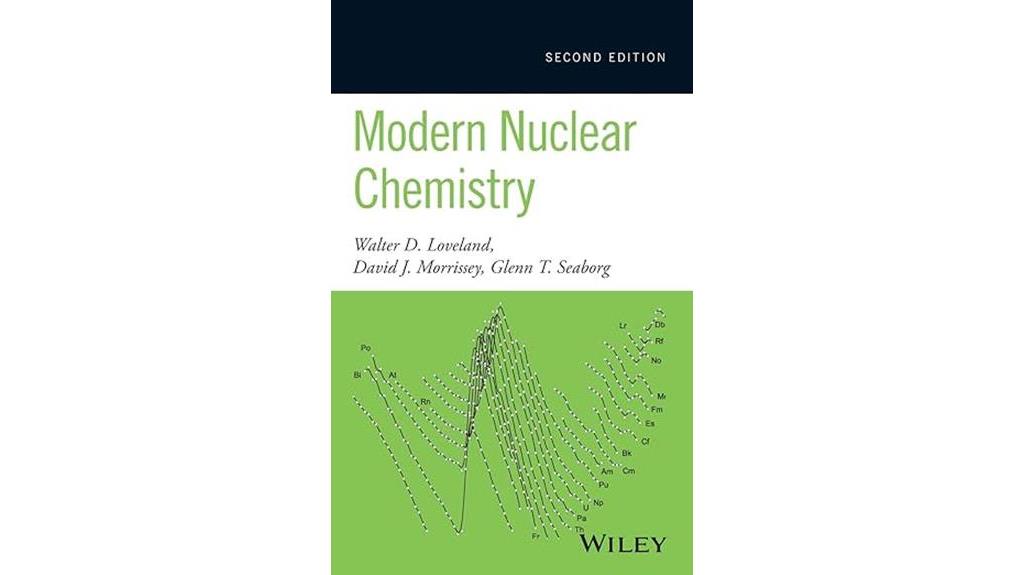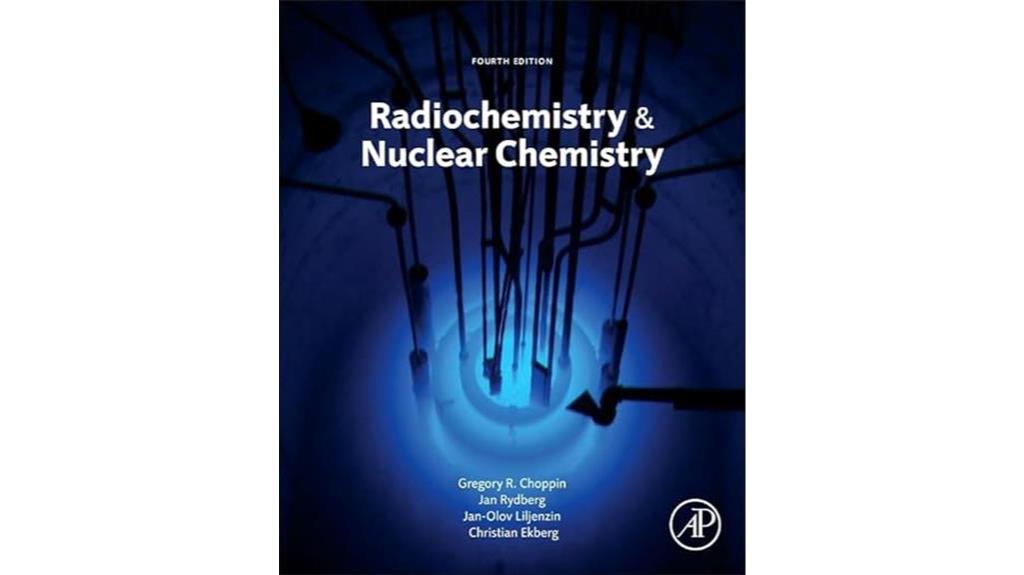When it comes to understanding nuclear chemistry, these three must-read books are 'Principles Of Nuclear Chemistry,' 'Modern Nuclear Chemistry,' and 'Radiochemistry and Nuclear Chemistry.' Each book covers fundamental concepts, from historical backgrounds to modern applications, ensuring a thorough grasp of this intriguing field. By exploring these resources, science enthusiasts can gain valuable insights and deepen their understanding of nuclear chemistry's principles and practices.
Key Takeaways
- Choose textbooks with comprehensive coverage and practical examples.
- Prioritize clear explanations and historical context in nuclear chemistry.
- Look for books with a balance between theory and real-world applications.
- Consider reviews for insights on readability and usefulness.
- Ensure the book aligns with your proficiency level and learning style.
Principles Of Nuclear Chemistry (Essential Textbooks in Chemistry)

If you're looking for a concise and budget-friendly resource to explore the principles of nuclear chemistry, 'Principles Of Nuclear Chemistry (Essential Textbooks in Chemistry)' offers a thorough examination of key concepts and applications in the field.
Covering a wide range of topics, including historical background and experimental advancements in medical applications, this textbook provides an extensive overview. Noted chapters like Chapter 8 on Nucleus, Spectroscopy, and Spectrometry, and Chapter 12 on Nuclear Power offer in-depth insights.
While described as relatively inexpensive and concise, some readers found the content too condensed for beginners. Criticisms regarding numerous typos, especially in mathematical derivations and decay reactions, have been noted.
Despite these drawbacks, the book receives an overall rating of four stars for affordability and succinctness, making it a valuable resource for those interested in nuclear chemistry.
Best For: Students and professionals seeking an affordable and concise overview of nuclear chemistry principles with a focus on key concepts and applications.
Pros:
- Thorough examination of key concepts and historical background in nuclear chemistry.
- Affordable resource for those interested in the field.
- Includes numerical problems for practice at the end of each chapter.
Cons:
- Content may be too condensed for beginners.
- Numerous typos present, especially in mathematical derivations and decay reactions.
- Some errors noted in elemental symbols not changing correctly in reactions.
Modern Nuclear Chemistry

Looking to gain an in-depth understanding of modern Nuclear Chemistry and its applications in various scientific fields? 'Modern Nuclear Chemistry' is the book for you. It offers a clear and understandable exposition of the subject, complemented by historical insights.
The explanations and worked examples are presented in a manner that's easy to follow, making it suitable for beginners and practicing chemists alike. This book is recommended for those seeking a broad understanding of how Nuclear Chemistry influences scientific, medical, biological, and engineering disciplines.
While some topics could have been organized differently within the text, the overall evaluation is positive, considering it an excellent resource and a valuable reference. Despite minor issues like a stain on the book and occasional writing inside, the content remains fully readable.
Best For: Beginners and practicing chemists looking to gain a broad understanding of Nuclear Chemistry in scientific, medical, biological, and engineering fields.
Pros:
- Clear and understandable exposition of modern Nuclear Chemistry.
- Historical insights included for additional context.
- Easy-to-follow explanations and worked examples.
Cons:
- Some topics could have been better organized within the text.
- Minor issues such as a stain on the book and occasional writing inside.
- The presence of some minor distractions, but overall content remains readable.
Radiochemistry and Nuclear Chemistry

For those pursuing a career in nuclear chemistry, the book on Radiochemistry and Nuclear Chemistry offers a thorough and well-organized approach to understanding the subject. The new version of this book has received praise for its extensive content, improved readability, and enhanced figures that aid in concept comprehension.
With rearranged chapters for better coherence and an eye-catching cover, this resource strikes a balance between theory and practical applications. While some readers have highlighted the need for better editing, the book remains highly recommended for its enlightening content, suitable for individuals with varying levels of familiarity with math, physics, and chemistry.
Overall, this book serves as an excellent introductory textbook in the field of radiochemistry and nuclear chemistry, catering to a diverse audience and providing valuable insights for science enthusiasts.
Best For: Individuals interested in pursuing a career in nuclear chemistry or seeking a comprehensive understanding of radiochemistry.
Pros:
- Extensive content with a good balance of theory and practical applications.
- Improved readability and user-friendly figures aid in concept comprehension.
- Able to cater to readers with varying levels of familiarity with math, physics, and chemistry.
Cons:
- Some readers have noted the need for better editing, particularly in terms of translation and grammatical errors.
- Minor flaws in editing may detract from the overall reading experience.
- Despite editing issues, the valuable content remains a highlight of the book.
Factors to Consider When Choosing Nuclear Chemistry
When selecting a book on nuclear chemistry, there are several important factors to keep in mind. Key considerations such as the level of detail, the author's expertise, and the relevance to your specific interests play a vital role in decision-making.
Essential features like clear explanations, practical examples, and updated content are also significant aspects to take into account.
Selection Criteria
When evaluating textbooks on nuclear chemistry, I prioritize the depth of coverage in various topics. This ensures a thorough understanding of nuclear reactions, decay processes, and their applications across different fields.
Clarity of explanations is another key factor. Clear and organized explanations help in grasping complex concepts effectively.
Presence of practical examples, numerical problems, and review questions are essential for reinforcing learning and applying theoretical knowledge.
Incorporation of recent advancements is crucial. Updated editions that reflect the dynamism of the field provide the latest information.
Alignment of language with my proficiency level is also important. Considering the readability and language of the textbook ensures it matches my learning style, facilitating easier comprehension and retention of information.
Important Factors
Considering the critical factors is vital when selecting a textbook on nuclear chemistry. To begin, one must evaluate the level of detail required, ranging from introductory to advanced topics, to make sure alignment with personal learning objectives.
The organization and clarity of the book play an important role in comprehending complex nuclear chemistry concepts effectively. Practical applications and real-world examples can greatly enhance learning and make the content more relevant and engaging.
Before making a decision, checking reviews or feedback on the accuracy of information, correctness of calculations, and presence of typos or errors is necessary to guarantee the reliability of the textbook. In addition, taking into account your background knowledge in chemistry, physics, and mathematics is key to selecting a book that matches your current proficiency level and learning goals.
Key Considerations
To choose the most suitable textbook on nuclear chemistry, one must carefully assess the level of detail required, the target audience, the clarity of explanations, the inclusion of relevant topics, and the alignment of language and writing style with personal preferences.
First, consider the depth of knowledge you seek, whether it's a basic introduction or a detailed analysis of nuclear chemistry principles.
Next, evaluate who the textbook is aimed at – students, researchers, or professionals in nuclear-related fields – to make sure it aligns with your expertise level.
Look for textbooks with clear explanations, worked examples, and practice problems to aid in understanding complex concepts. Additionally, check if the book covers specific topics of interest like nuclear power, medical applications, or environmental implications.
Lastly, consider the language and writing style used in the textbook to ensure it resonates with your learning style and facilitates comprehension.
Decision-Making Aspects
In the process of selecting a nuclear chemistry textbook, my focus lies on evaluating essential decision-making aspects.
Firstly, I consider the level of depth and complexity required in the content, ranging from introductory to advanced topics. This guarantees that the material aligns with my proficiency and learning goals.
Next, I prioritize evaluating the clarity and organization of the material, making sure it matches my learning style for effective comprehension. Additionally, I look for practical examples and applications that resonate with my interests or career aspirations in nuclear chemistry.
It's vital to find a resource that strikes a balance between theoretical concepts and practical applications to develop a thorough understanding of nuclear chemistry principles.
Essential Features
When selecting a textbook on nuclear chemistry, it's important to prioritize essential features that align with your learning objectives and level of expertise. Look for books that cover fundamental topics like nuclear reactions, radioactive decay, and their applications across various fields.
It's vital to choose a textbook that offers clear explanations, worked examples, and practice problems to aid in understanding and retention of key concepts. Consider the level of depth you require – whether you're a novice in the subject or an experienced chemist looking to explore further into nuclear chemistry.
Textbooks that provide historical insights and practical applications can help you grasp the significance of nuclear chemistry in scientific, medical, and engineering domains. Additionally, evaluating the readability, coherence, and visual appeal of a textbook is important, as these factors can greatly impact your learning experience and engagement with the material.
Critical Elements
Considering the depth of study needed and the clarity of explanations is important when selecting a textbook on nuclear chemistry. Understanding your own level of knowledge and the complexity you seek, whether introductory or advanced, is vital.
The book's organization and how clearly it presents concepts should match your learning style for best comprehension. Practical examples, illustrations, and real-world applications can greatly aid in grasping nuclear chemistry principles.
Checking reviews for accuracy and reliability makes sure you're learning from a reputable source. Additionally, evaluating the book's alignment with your background in math, physics, and chemistry can make your learning journey smoother.
Choosing Wisely
One important consideration when choosing a nuclear chemistry textbook is my current level of understanding in the subject. If I'm a beginner, I should opt for textbooks that provide a solid foundation in nuclear chemistry basics before delving into more complex topics.
It's important to look for textbooks that cover a wide range of subjects within nuclear chemistry to ensure a thorough learning experience. Checking reviews for feedback on the clarity of explanations and examples can help in selecting a textbook that aligns with my learning style and preferences.
Moreover, considering any specific areas of interest within nuclear chemistry, such as medical applications or nuclear power, is crucial when choosing a textbook to make sure it caters to my interests.
Deciding Factors
Key considerations play an essential role in selecting the most suitable nuclear chemistry textbook. When deciding on a book, it's important to assess your level of expertise in chemistry. Beginners may benefit from textbooks that offer a gentler introduction to the subject, while those more advanced might prefer in-depth analyses.
Look for a thorough coverage of topics, encompassing historical context, fundamental principles, and real-world applications. Reviews can offer valuable insights into the clarity of explanations, readability, and the presence of practical examples for enhanced understanding. The organization of the content is also important; a logical sequence can facilitate easier comprehension.
Lastly, consider feedback on the book's physical condition to make sure it remains readable and usable. By keeping these factors in mind, you can make an informed decision when choosing a nuclear chemistry textbook that best suits your needs and preferences.
Frequently Asked Questions
Are There Any Recommended Supplementary Materials to Enhance Understanding?
To enhance understanding, I recommend seeking supplementary materials like online tutorials, scientific articles, and educational videos. These resources can provide different perspectives and explanations that complement the knowledge gained from textbooks.
How Can One Apply Nuclear Chemistry Principles in Real-World Scenarios?
Using nuclear chemistry principles, I can optimize medical imaging techniques, develop clean energy sources, enhance food preservation methods, and guarantee the safety of nuclear reactors. The applications are diverse and impactful in real-world scenarios.
What Are the Career Prospects for Those Specializing in Nuclear Chemistry?
Career prospects in nuclear chemistry are promising. Opportunities exist in research, nuclear power plants, medical diagnostics, environmental monitoring, and more. With specialized knowledge, one can contribute to advancing technology, energy, and healthcare.
Are There Any Notable Controversies or Debates Within the Field?
Like a lively debate show, controversies in nuclear chemistry spark curiosity. Some revolve around safety protocols, waste disposal, and reactor designs. These discussions, though complex, fuel progress and innovation in the field.
How Has Nuclear Chemistry Research Evolved in Recent Years?
In recent years, nuclear chemistry research has seen advancements in areas like nuclear waste management, medical imaging, and nuclear energy production. New technologies and methodologies have enhanced our understanding and applications in this field.
Conclusion
To sum up, delving into the world of nuclear chemistry through these recommended books can provide a deeper understanding of the principles and applications of this fascinating field.
For example, reading 'Modern Nuclear Chemistry' helped me grasp the complex processes behind nuclear reactions and their impact on various industries.
So, whether you're a seasoned scientist or just starting out, these books are sure to expand your knowledge and appreciation for nuclear chemistry.
Happy reading!
Bulletin Of The Atomic Scientists
Author by :
Languange Used : en
Release Date : 1961-05
Publisher by :
ISBN :
Description : The Bulletin of the Atomic Scientists is the premier public resource on scientific and technological developments that impact global security. Founded by Manhattan Project Scientists, the Bulletin's iconic "Doomsday Clock" stimulates solutions for a safer world....
Bulletin Of The Atomic Scientists
Author by :
Languange Used : en
Release Date : 1955-04
Publisher by :
ISBN :
Description : The Bulletin of the Atomic Scientists is the premier public resource on scientific and technological developments that impact global security. Founded by Manhattan Project Scientists, the Bulletin's iconic "Doomsday Clock" stimulates solutions for a safer world....
Handbook Of Nuclear Chemistry
Author by : Attila Vértes
Languange Used : en
Release Date : 2003
Publisher by :
ISBN :
Description : ...
Principles Of Nuclear Chemistry
Author by : Peter A. C. McPherson
Languange Used : en
Release Date : 2017
Publisher by : Essential Textbooks in Chemist
ISBN :
Description : Principles of Nuclear Chemistry is an introductory text in nuclear chemistry and radiochemistry, aimed at undergraduates with little or no knowledge of physics. It covers the key aspects of modern nuclear chemistry and includes worked solutions to end of chapter questions. The text begins with basic theories in contemporary physics and uses these to introduce some fundamental mathematical techniques. It relates nuclear phenomena to key divisions of chemistry such as atomic structure, spectroscopy, equilibria and kinetics. It also gives an introduction to f-block chemistry and the nuclear power industry. This book is essential reading for those taking a first course in nuclear chemistry and is a useful companion to other volumes in physical and analytical chemistry. It will also be of use to those new to working in nuclear chemistry or radiochemistry....
Nuclear Chemistry
Author by : Axel N. Koskinen
Languange Used : en
Release Date : 2014-05-14
Publisher by : Nova Science Publishers
ISBN :
Description : ...
Bulletin Of The Atomic Scientists
Author by :
Languange Used : en
Release Date : 1979-03
Publisher by :
ISBN :
Description : ...
Modern Nuclear Chemistry
Author by : Walter D. Loveland
Languange Used : en
Release Date : 2013
Publisher by :
ISBN :
Description : ...